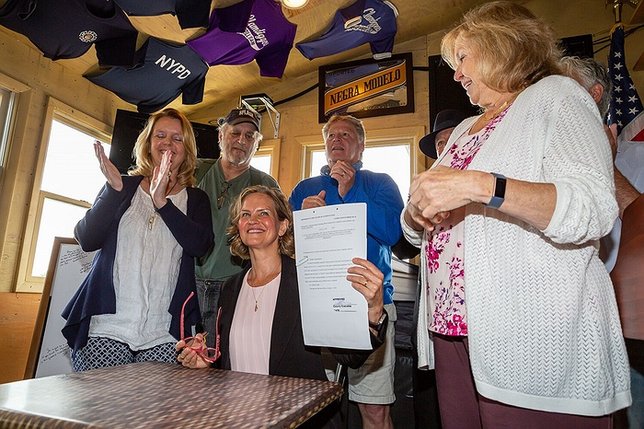Nassau County Executive Laura Curran signed into law a ban on the sale and distribution of polystyrene foam containers (better known by the brand name Styrofoam) in Nassau County. County Executive Curran, joined by local officials and environmental advocates, signed the legislation into law at Jeremy’s Ale House, a staple on the Nautical Mile famous for their use of Styrofoam cups.
Last month, the Nassau County Legislature voted unanimously to adopt the legislation co-sponsored by Legislators Debra Mule (D-Freeport), Denise Ford (R-Long Beach), and Laura Schaefer (R-Garden City).
“Today, Nassau County is taking a big step towards the future,” said Nassau County Executive Laura Curran. “Non-biodegradable polystyrene can’t be recycled like most products. So, while that coffee may be finished, the Styrofoam cup that was holding it won’t be. It will break down into small pieces – clogging our waterways, polluting our environment, hurting our wildlife, and even damaging local industries like fishing and tourism. We only have one Long Island – we must protect it.”
“Toxic, non-biodegradable Styrofoam devastates the waterways we cherish. I’m proud to stand with County Executive Curran and my colleagues as a co-sponsor this important bipartisan environmental initiative, “said Legislator Debra Mulé (D - Freeport.) “I am hopeful that today’s action reflects a major step forward in our efforts to encourage Nassau County residents to move beyond wasteful single-use products and embrace sustainable alternatives.”
"I was proud to join my colleagues in voting unanimously to approve legislation I co-sponsored banning polystyrene products in Nassau County, and am excited to see it signed into law,” said Legislator Denise Ford (R- Long Beach). “This will not only reduce the waste stream in Nassau County and provide reductions in waste disposal costs, it will also help unclog our waterways and better protect our natural environment."
“We’ve heard about the dangers of polystyrene foam for years now, and I am happy we are finally taking action,” said Legislator Laura Schaefer (R-Garden City). “These containers pollute our environment and clog our waterways. Enough is enough. This is an important step for a cleaner and healthier Nassau County.”
“Big problems need bold action,” Adrienne Esposito, Executive Director of Citizens Campaign for the Environment. “Styrofoam is littering our communities, beaches, and bays. Containers meant to transport food and beverages leach toxic styrene. Kudus to Nassau County for stepping up to tackle this pollution and public health concern by banning Styrofoam take-out containers, cups and plates. Making the switch to more sustainable options is good for our environment and our health.”
Polystyrene foam – better known by its brand name Styrofoam – has been classified as a carcinogen, and in most cases is completely non-biodegradable. After breaking into small pieces, it becomes harder to clean up and its composition of fossil fuels and synthetic chemicals helps trigger serious hazardous waste and environmental damage, including killing marine life that consumes it.
On Long Island, it has been known to clog waterways and dramatically increase the cost of waste disposal for authorities. There is no practical method for recycling polystyrene foam, and incineration results in toxic fumes being released into the environment.
Businesses in Nassau County will have until January 1, 2020 to use up their existing reserve of polystyrene foam containers before the ban takes place. After that date, any business violating the law will be given fines from the Office of Consumer Affairs. The fines for first offense are up to $500, second offenses up to $1,000, and third and subsequent offenses up to $2,500. The money from those funds will provide for environmental investigation and cleanup of Nassau County properties.










